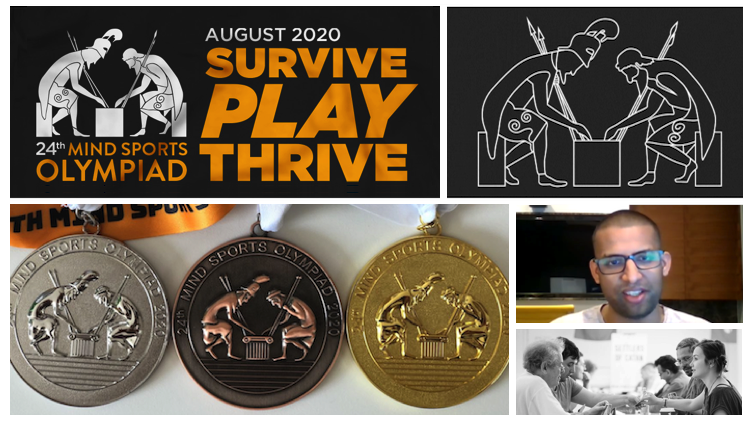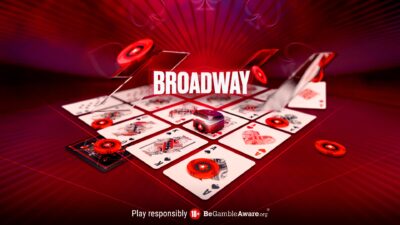After a full month of intense competition, the 24th annual Mind Sports Olympiad recently concluded.
There was a lot that was different about this year’s running of the international multi-disciplined competition. However one thing was the same, at least when compared with recent past — Ankush Khandelwal captured the MSO’s crowning title, the Pentamind, his third straight and fourth overall.
Thousands of players, over 100 countries represented
As we shared back at the start of this year’s event, there was one huge difference this year — the MSO was contested entirely online.
Typically a chance for players to gather in London to compete at chess, bridge, backgammon, poker, Go, Scrabble, Catan and dozens of other games, the COVID pandemic forced the competition to go virtual.
Employing a variety of different online platforms — including PokerStars for seven poker tournaments — players competed in 100 events as well as eight “meta-events” (like Pentamind) in which multiple events’ scores were combined.
 The games might have been on screens, but the 2020 Mind Sports Olympiad medals are very real
The games might have been on screens, but the 2020 Mind Sports Olympiad medals are very realAs it turned out, rather than prevent people from enjoying the MSO, the change made it possible for more players than ever to take part.
There were an astounding 11,212 entries across all the events, with 5,884 unique competitors. Most who played participated in one or two events, although 228 players played five or more and 102 played 10 or more.
To qualify for the Pentamind, players had to register scores in five different games. There were 130 who qualified, with Khandelwal ultimately recording the highest combined score.
Perhaps most amazingly, players from 106 different countries took part — way more than has ever been the case before with in-person Mind Sports Olympiads. And players from 56 different countries won medals!
Martin Isaac hangs on to win Amateur Poker World Championship
For poker players, the Amateur Poker World Championship provided some special excitement.
Your humble scribbler actually took part, playing all seven of the tournaments which consisted of no-limit hold’em, pot-limit Omaha, seven-card stud, five-card draw, heads-up hold’em & heads-up Omaha, and 6+ hold’em.
 Martin Isaac, Amateur Poker World Champion
Martin Isaac, Amateur Poker World ChampionThe title of Amateur Poker World Champion went to the player earning the highest total among five finishes in the poker events. In a way the structure resembled hold’em or stud hand. Instead of using the best five cards out of seven to make your hand, you used your best five results out of seven to make your score.
Somehow I managed to sneak into the top 20 of the poker rankings, though by the final event — 6+ hold’em — I knew I was out of the running to reach the top spot, even if I had won that final tourney.
Jamie Reeve was sitting just outside the top 10 when the last tournament happened, and so he knew with a little luck he might have a chance. Reeve did as well as he possibly could — he won the tournament — but alas it was only good enough for a second-place finish overall.
That’s because leader Martin Isaac, knowing he only had to make the top 36 or so to clinch the gold medal, had gone out before him in 34th. A long time poker player, Isaac has been playing on PokerStars for a decade or so and has visited the WSOP a couple of times, too.
Meanwhile Dario de Toffoli took the poker bronze.
The world plays games: A global event with a ‘community feel’
“It has been an amazing month, and I’m exhausted and exhilarated,” said organizer Etan Ilfeld when I spoke to him following the conclusion of this year’s MSO.
“This was definitely the most competitive Mind Sports Olympiad ever. We had incredible numbers, and it was incredibly global. But we were able to maintain an incredible community feel as well through Discord, Facebook, and the live streams on YouTube and Twitch. It was just a great atmosphere for the participants.”
I can attest to that fact, with the ease of registering and following events via the MSO website adding greatly to the experience of this first-time Olympiad participant.
“I’m grateful also to PokerStars,” Ilfeld adds. “The interface was phenomenal — the players loved it.”
The experience taking MSO online went so well, it seems certain there will be more online events going forward.
“I don’t know what the future exactly holds, but we’ll definitely have an online element to the MSO going forward,” Ilfeld notes. Possibly there could be two events — one online and one live — although in that case a decision will have to be made regarding how the Pentamind is awarded.
Talking to Ankush Khandelwal, Pentamind champion
Speaking of, Pentamind is the marquee competition of MSO in which the player earning the five highest scores (in five different games) earns the title. Ankush Khandelwal jumped into first early on during this year’s MSO, and managed to hold off some talented competition to win his third straight Pentamind and fourth overall.
“Ankush is a great champion. An incredible poker player and incredible games players — he’s a genius,” says Ilfeld. “Certainly, for the moment, he’s proven himself to be the best games player in the world.”
Khandelwal picked up gold medals in four different games, and also earned won the Eurogames World Championship, another multi-game medal. He put in some serious volume during the competition as well, playing in more than 40 events and 21 unique games (more than anyone else).
 Ankush Khandelwal, winner of the 2020 Mind Sports Olympiad Pentamind
Ankush Khandelwal, winner of the 2020 Mind Sports Olympiad PentamindKhandelwal is a full-time poker pro (heads-up pot-limit Omaha is his specialty) and also plays bridge and Agricola frequently throughout the year. But leading up to the MSO he devoted time to studying many other games as well, and that study paid off.
That said, Khandelwal also relied on his own versatility and experience as a game player to excel. In fact, one of his gold medals — and one of his five Pentamind scores — came in a game he had only played two or three times before, Marco Polo.
I asked him about how playing online introduced new and different challenges during his quest for a fourth Pentamind title.
“Being used to the interfaces on the different platforms we played… [that] was important for a competitor to know,” he says. Knowing, for instance, what happened when a timer went to zero on a given site definitely could give a player an edge over an opponent who lacked such familiarity.
“It was actually more pronounced on other sites” than PokerStars, Khandelwal points out. “Because PokerStars has got excellent software, it is very easy to use for beginners,” therefore making familiarity with the platform less crucial. But on other sites and with other games that wasn’t as much the case.
Playing online also made it possible for Khandelwal not just to multi-table, but “multi-game” by playing two different games at once. In fact one time he was playing three different games — bullet chess, Perudo, and Jaipur.
“It actually worked out okay, but it was very tricky,” says Khandelwal. “I actually did all right in two of the tournaments I played that day. I won a gold in Perudo and got a joint third in chess.”
When he’s not playing the Mind Sports Olympiad, Khandelwal mostly focuses on poker (his living) and bridge (which may become a future career, he says). But he’ll play other games as well. After all, he points out, money isn’t his only motivation to play games.
“There are some games I just love to play,” he says. “With the other games I’m just playing purely for the challenge and enjoyment I get out of it.”
Some game recommendations for poker players
Speaking of venturing out and trying other games, I asked Khandelwal for some recommendations of other Mind Sports games that poker players in particular might enjoy.
 Poker players… give Perudo a try
Poker players… give Perudo a try“They should definitely try Perudo, which is Liar’s Dice. It’s also called Liar’s Poker, so it’s got the name poker in it,” he says. “It’s a game about bluffing, about mixed strategies… it’s very much a poker player’s game. When I play it, I’ve used some of the modeling techniques I use in poker to study this game. I recommend that one.”
“I think all poker players would really enjoy bridge as well. I think, again, it’s a very similar skill set, a game of incomplete information where you’re trying to maximize your equity. I think poker players should play those two games for sure.”
“And maybe backgammon as well. That’s always been a great gambling game, and again it is to do with the odds and making the right decisions.”
Poker players, take heed. Go learn Perudo, bridge, and backgammon, and perhaps a few other games, and maybe next year you, too, can compete with Khandelwal for the Pentamind.
Back to Top







